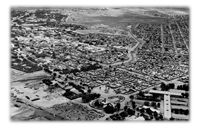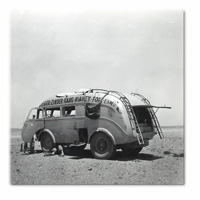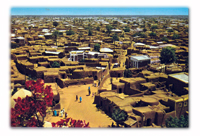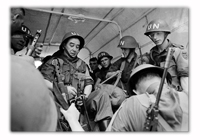Returning to Northern Nigeria in 1946 on my second tour I was posted to Bornu Province. There were only three officers in the Province instead of the normal twelve. My job was ADO Provincial Office with a multitude of duties.
Demobilization was in hand and a hundred soldiers, recently returned from Burma, arrived in Maiduguri under the charge of two young British officers on their way up to Fort Lamy in Tchad. I sought permission to join them so that I could see what went on in our neighbouring French colony.
 |
| Fort Lamy |
Lent the use of the UAC manager's house in Fort Lamy, we were there on Bastille Day. When we went to the Cercle or club everyone stood up, removed their hats, and we were thanked with a speech praising the British, and in particular the Nigerian Forces, for the help they had given in 1943. That was when the Free French under General LeClerc de Haute-Cloche had led an armoured brigade from the Gabon and the Cameroons across the Sahara through the Fezzan to take Rommel in the southern flank, while Montgomery was attacking Rommel from the east in Tunisia and the new American forces from the west. The British Army officers had no French, so I had to step in, making a speech in French in reply, which fortunately seemed to go down well.
 |
| Broken Down in the Sahara |
I was keen to find out more about the peoples in the French Territories. During the war the Free French ruled the Gabon, Cameroons and the Western Sudan, while the pro-German Vichy Petainists ruled Niger to the north and all the French colonies to the west. My next attempt to discover what went on over our frontiers was to cross the Sahara, a journey of some 2500 miles, from Algiers in the north, southwards to Kano in Northern Nigeria. I made the journey by bus, a large beetle-like vehicle with balloon tyres carrying six passengers and a ton and half of freight. After Tamanrasset in the Hoggar Mountains we began the toughest part of the desert crossing through sandy and rocky country, with large areas of soft sand, often getting stuck and having to dig ourselves out. After a few days we began to see herds of camels and cattle at large watering holes. At one of these I saw a group of Africans, obviously not Tuareg, sitting under a thorn tree. I spoke to them in Hausa and learned that they were Rahji Fulani with their cattle who often crossed the frontier between Niger and Northern Nigeria in search of the best pastures. I only had a few words of Fulani but they all spoke Hausa, and were intrigued to find a European speaking to them in an African language, as the French officials refused to study the local African languages. They admitted that they had to be careful not to spend long periods in Northern Nigeria or they would be caught for Jangali, the cattle tax.
In Kano I said goodbye to my fellow travellers, French engineers who were continuing on to Fort Lamy, a further 400 miles. I heard them refer to me as 'Ce type tres Squire'!
In 1960 when I was Senior District Officer in charge of Kano division we heard that the Emperor Hailie Selassie of Ethiopia was going to stop off at Kano airport for a day. In the absence of the Resident, who was in Kaduna, I was in charge. I met the Emperor at the airport. Accompanied by his daughter, he refused to speak to me, although he spoke good English, and insisted on issuing instructions to his daughter who would only pass them on to me in French. They wanted to see the old walled city of Kano but would not have time to visit the Emir. I took them to the parts of the city that could be visited by car, in particular three of the old gates that were still standing. I explained to them how Islam had come across to Kano in the 13th and 14th centuries, and how Kano had rivalled Timbuktu as the main trading entrepot south of the Sahara. Amongst other things we viewed the Emir's palace from the outside, and the mosque, a modern building built by the Public Works Department. Also of interest was the Sabon Gari, the new town area with canteens, railway depots and trading centres.
 |
| Kano |
In October 1960 Nigeria achieved independence. We had good relations with the Premier of Northern Nigeria, the Sardauna of Sokotu, Alhaji Ahmadu Bello, who depended heavily on the remaining colonial officers for the new administration of Northern Nigeria. I was appointed Senior Acting Resident of Kano. So when Pandit Nehru and Mrs Gandhi, two eminent Indian politicians, had to make an unscheduled stop for a few hours in the middle of the night it was my duty as the senior government representative to look after them. This we did as best we could at the airport, although neither was prepared to talk much about international affairs. As it was still raining when their plane was ready to leave I had my car brought round to the front of the building. With my official driver at the wheel of the car I opened the passenger door for Pandit Nehru to get in and then went round to the other side to open the car door for Mrs Gandhi. She refused, saying, 'Mr Bird, you must get in first', and explaining that for security reasons she could only feel confident of her own safety if I got into the car before her.
1961 brought a visit from HRH Prince Philip, Duke of Edinburgh, who stopped off in Kano on his way to take the Independence Celebrations for Tanganyika. We were between Residencies at the time, posing a logistical challenge. The old mud built residency with its 15-foot high vaulted mud ceiling, though an impressive historic building resembling an emir's palace, was not suitable for putting up royalty, whereas the new Residency had an air-conditioned bedroom. I arranged for the local hotel manager and his staff to look after the royal party in the new Residency, while I gave a reception at the Old Residency so Prince Philip could thank the Commissioner of Police and the Superintendent who had provided an escort.
In 1961 we had a battalion of Belgian Paratroopers on their way home, camped at Kano airport, having handed over to the incoming United Nations peacekeeping forces in the Republic of the Congo. On the other side of the airport we had a battalion of African Mali troops going to the Congo. Fortunately the Nigerian police were able to keep them apart as the nearest units of the Nigerian army were some 130 miles away in Kaduna, so no use in an emergency.
 |
| Irish UN troops |
Not long after this we had an Irish Army battalion transit through Kano, on their way to join the UN forces in the Congo. The Colonel and a few officers came to a party at the Residency where they were amused to find that during the war I had served with the Regiment of Pearse, the Dublin College's local defence force who trained with the Irish army in the Wicklow Hills and went on manoeuvres through the back streets of north Dublin defending the city against a possible German invasion.
The Trinity College Dublin connection had proved equally useful when I was instructed to meet Mr Sean Lemass, the Prime Minister of Ireland, who was visiting Kano with the new Irish Ambassador Eamon Kennedy. He was most put out to find a white official receive him on behalf of the government of the recently independent Northern Nigeria. Mr Kennedy and I had met at the 1942 Regatta at Droghedra, where Trinity College Dublin were the victors at the rowing championships of Ireland, so he was able to reassure Mr Lemass that Ronnie Bird was a good sort and an Irishman at heart.
In 1962 the office of Resident was abolished and I was appointed Provincial Secretary with a Provincial Commissioner as the political head of Kano Province. This role fell to a friend of mine, The Honourable Alhaji Aliyu Magajin Gari Sokoto, whom I had known in Sokoto as a senior member of the Sultan's Council in 1957- 58. We got on well and as Provincial Secretary I continued with my normal duties while Alhaji was the figurehead nominally in charge.
In April 1963 it was time for me to say my goodbyes after twenty years working in Northern Nigeria. I was given a grand send-off led by Madakin Kano, a brilliant administrator, with the whole of the Emir's Council in support. The Nigeria Police Band played the moving tune of the Hausa Farewell and tears flowed on all sides.
No comments:
Post a Comment
Note: Only a member of this blog may post a comment.